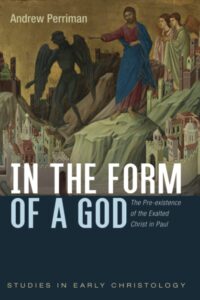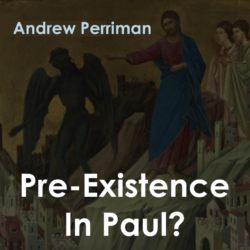Listen to this episode on Spotify or Apple Podcasts
 Philippians 2.6-11 has generated an immense amount of scholarly literature such as journal articles and monographs not to mention blog posts, video lectures, and podcasts. What does the enigmatic phrase “in the form of God” mean? Did Paul intend us to think Jesus refused to grasp at equality with God or that he refused to exploit the equality he already had? What does it mean that Jesus emptied himself? Today we are getting into the weeds in order to understand what Philippians 2 is all about. I don’t want to say too much before you get a chance to listen, but I can at least tell you this: Dr. Perriman does not believe it’s about a pre-existent being becoming a human.
Philippians 2.6-11 has generated an immense amount of scholarly literature such as journal articles and monographs not to mention blog posts, video lectures, and podcasts. What does the enigmatic phrase “in the form of God” mean? Did Paul intend us to think Jesus refused to grasp at equality with God or that he refused to exploit the equality he already had? What does it mean that Jesus emptied himself? Today we are getting into the weeds in order to understand what Philippians 2 is all about. I don’t want to say too much before you get a chance to listen, but I can at least tell you this: Dr. Perriman does not believe it’s about a pre-existent being becoming a human.
“Morphe is never used of the one living God, the one true God, for the simple reason that it always has reference to the external appearance of an object or a person or a god.” -Andrew Perriman
My guest today is Andrew Perriman who has a degree in English Language and Literature from Oxford as well as an MPhil and PhD from the London School of Theology where he currently works as an Associate Research Fellow. He teaches New Testament and works with graduate students on biblical interpretation.
See also the previous episode on the other texts in Paul’s epistle that traditional Christians think teach Jesus pre-existed.
—— Links ——
- Follow Andrew Perriman at his postost blog
- Get In the Form of a God from Wipf & Stock or from Amazon
- Check out these previous episodes about pre-existence
- Get the transcript of this episode
- Support Restitutio by donating here
- Join our Restitutio Facebook Group and follow Sean Finnegan on Twitter @RestitutioSF
- Leave a voice message via SpeakPipe with questions or comments and we may play them out on the air
- Intro music: Good Vibes by MBB Attribution-ShareAlike 3.0 Unported (CC BY-SA 3.0) Free Download / Stream: Music promoted by Audio Library.
- Who is Sean Finnegan? Read his bio here







In Philippians 2:5-6 Paul talks about Christ.
In 1 Cor 15:45 Paul refers to both the first man — Adam, and also to the last Adam.
Genesis records that the first man – Adam, was created in the image and likeness of God, i.e. in the form of God, and by his disobedience, the first Adam grasped at equality with God.
Both the first Adam and the last Adam were each in the form of God, so I suggest that with such things in his mind, in Philippians 2:5-6 Paul is simply contrasting the disobedience of the first man Adam with the obedience of the last Adam – Christ, the foundation on whom we rest for our redemption and salvation from sin.
Unlike the first Adam, the last Adam – Christ, did not count equality with God a thing to be grasped and He remained obedient even unto His death on a cross, vv 7-8.
In light of the above, the notion that Christ had/has Trinitarian characteristics was wholly absent from Paul’s train of thought. When Paul wrote to the Philippians the concept of the Trinity was not even in it’s infancy and could not have been heard of by them.